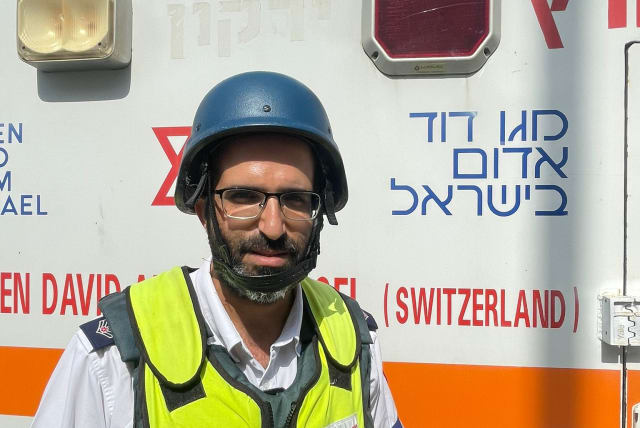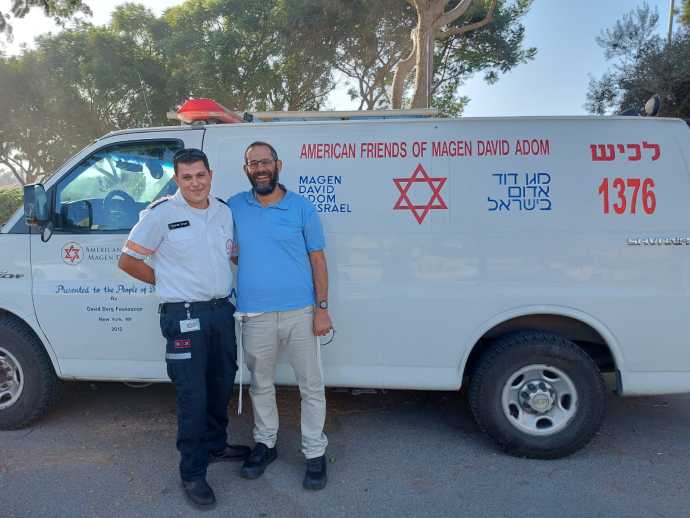'They shot the ambulance, they shot the station, they are shooting everywhere'

MDA Sderot station. The story of Elor Tawil.
Elor Tawil, a longstanding and well-respected volunteer at the Sderot MDA station, is a father of five – the youngest of whom was only two weeks old at the time. That morning in the safe room, he kissed his wife and children goodbye, and made his way to the MDA station, as he had done many times in the past in Sderot, a city that has been in the line of fire for years. Elor expected to help his colleagues treat those injured by falling missiles; no one yet knew that this situation would be entirely different. When Elor arrived at the station, despite being an observant Jew who refrains from using his phone on the Sabbath, he called his wife and told her: “There are terrorists inside the city. Stay inside the safe room. Spread the word as widely as you can.” Elor then decided to take the initiative by starting up the bullet-proof ambulance and preparing it for evacuating the wounded. It was then that paramedics Netanel Dahbash and Amit Hananya transferred the gunshot victim they had been treating to the ambulance and evacuated him to the hospital, despite the presence of terrorists inside the city.
The team operating the armored intensive care ambulance began evacuating the wounded, a mission that would last until the early hours of the following morning. At a certain point, Amit Hananya moved to a separate ambulance, and Hadar Koltaker, another paramedic, took his place. At first, they evacuated those who were being treated at the MDA station, and then they moved on to everyone else in need of urgent treatment in Sderot, which had turned into a battlefield. It was a race between good and evil: while the terrorists continued their fire, the MDA teams scrambled to reach the victims, provided life-saving emergency care, and got them to the hospital as quickly as possible, all while selflessly risking their own lives.
The paramedic who worked with Hadar during the night shift, Naor Sabag, also continued treating the wounded throughout the day. “During our first evacuation, we understood how serious this was,” he recalls. “When we saw bodies lying on the streets, bodies inside cars… dozens of people killed. We treated our patient, who was in serious condition, during the journey to the hospital and felt like we were on our way into the unknown. This was such a familiar route to all of us, from the city to the hospital – as if the wheels of the ambulance could take us there without our help – and suddenly, it felt like something straight out of a horror movie. At a certain point, we were called to the Sderot police station. We treated brave combat soldiers who had sustained wounds all over their bodies, their condition deteriorating from the loss of blood. We treated them as best we could and evacuated them for further treatment. On our way back from that journey, we were stopped by another group of soldiers, one of whom had sustained a severe head injury which had to be treated on the spot if there was to be any chance of saving him. We stopped on the side of the road, got out our medication, gave him life-saving emergency treatment, and then continued to evacuate him.”
I asked Hadar why they decided to treat the patient in such dangerous conditions. She said, “Because that’s who we are; that’s our purpose. I know that I’m in a dangerous area. But every passing minute is critical for my patient’s chances of survival and for myself. That’s our job; that’s what we learned to do. I also felt good about the team I was working with,” she says.
When they returned to the Sderot police station, they heard gunfire and explosions and immediately understood that the attack wasn’t close to being over. More and more soldiers were injured. Despite the indiscriminate killing in the streets, the team didn’t lose sight of the task at hand or their humanity. At a certain point, the team was called to the home of an elderly couple. A senior citizen had been shot, and his wife sat with him. It soon became clear that the man hadn’t survived the attack. “What do we do now?” they recall asking themselves. “It’s Shabbat. There are terrorists throughout the city. Is this elderly woman supposed to stay here the whole day with the corpse of her murdered husband? We took her to the bullet-proof ambulance and drove her to her daughter’s home.” 
Jerusalem Post Store
`; document.getElementById("linkPremium").innerHTML = cont; var divWithLink = document.getElementById("premium-link"); if (divWithLink !== null && divWithLink !== 'undefined') { divWithLink.style.border = "solid 1px #cb0f3e"; divWithLink.style.textAlign = "center"; divWithLink.style.marginBottom = "15px"; divWithLink.style.marginTop = "15px"; divWithLink.style.width = "100%"; divWithLink.style.backgroundColor = "#122952"; divWithLink.style.color = "#ffffff"; divWithLink.style.lineHeight = "1.5"; } } (function (v, i) { });

